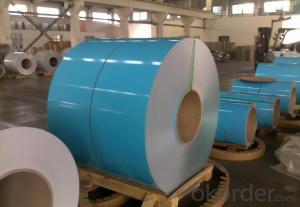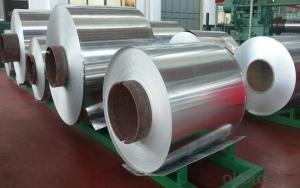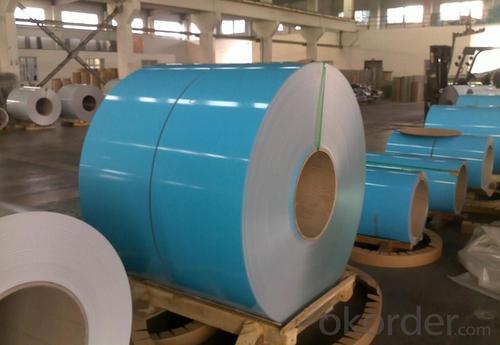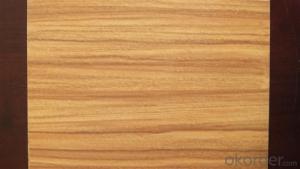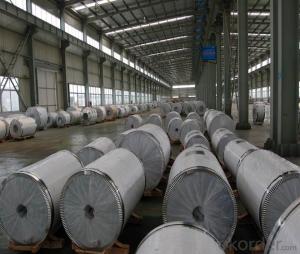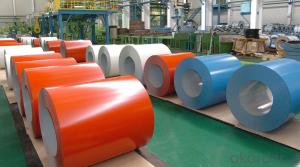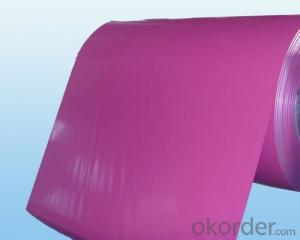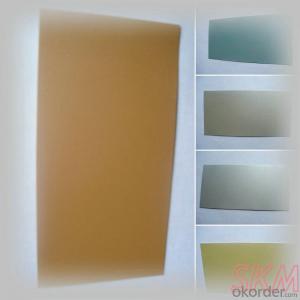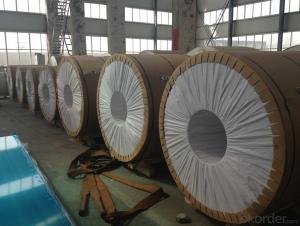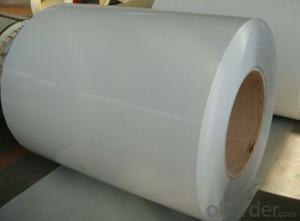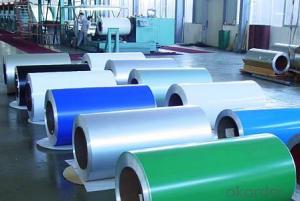Prepainted Aluminum Coil for Sale - Color Coated Aluminum Roll for Glass Curtain Wall Frame
- Loading Port:
- Shanghai
- Payment Terms:
- TT OR LC
- Min Order Qty:
- 2 m.t.
- Supply Capability:
- 50000 m.t./month
OKorder Service Pledge
OKorder Financial Service
You Might Also Like
Specification
Color Coated Aluminium Roll For Glass Curtain Wall Frame
Specifications
Grade | 1050,1060,1070, 1100, 1200, 2024,3003, 3004,3005, 3105, 5005,5052 5182,5754,8011 etc |
Thickness | 0.1~1.5mm |
Width | 100~2500mm |
Surface Treatment | PVDF and PE coated |
Temper | O-H112 |
Hardness | More than 2H |
Yield(≥MPa) | 160 |
Ultimate Strength(≥MPa) | 175 |
Elongation(≥%) | 6 |
Packing Material | Moisture-proof agent, steel tape bundle, wooden pallet, brown paper |
Method | Vertical(eye to sky) or horizontal(eye to wall) |
Standard Specification | 1000mm×C, 1200mm×C, etc |
Shipping | Container Loading or Bulk Pack |
Characteristics
1) Excellent weather-proof durability
2) Anti-ultraviolet
3) High erosion resistance
4) Stable color and gloss
5) Good mechanical processing performance
6) Abrasion resistance
7) Anti-impact
8) High flexibility
Coating varieties
Polyester Coatings (PE)
PE (polyester) coatings exhibit an excellent combination of hardness, flexibility, flow, appearance, and superior resistance to dirt retention in indoor and outdoor applications. These coatings are highly resistant to abrasion, metal marking, staining, and marring, and require minimal maintenance. Glazetech uses polyester paints which provide excellent colour and gloss retention properties.
Polyvinylidene Fluoride Coatings (PVDF)
PVDF (polyvinylidene fluoride) is a chemical resistant thick film barrier coating commonly used in architectural applications where both excellent appearance and substrate protection must be maintained over a long period of time. This coating is unaffected by most chemicals and solvents and has excellent wear and abrasion resistance. PVDF also has a high dielectric strength, excellent resistance to weathering and the ability to self extinguish.
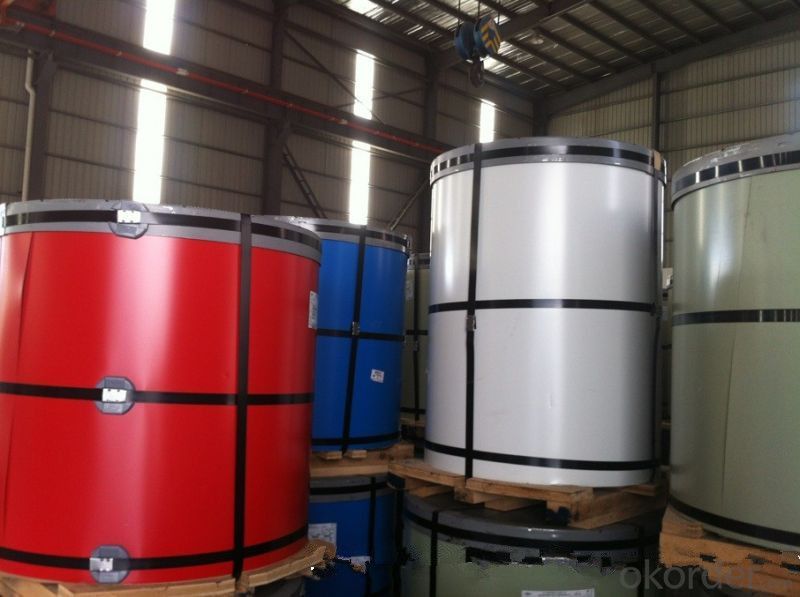
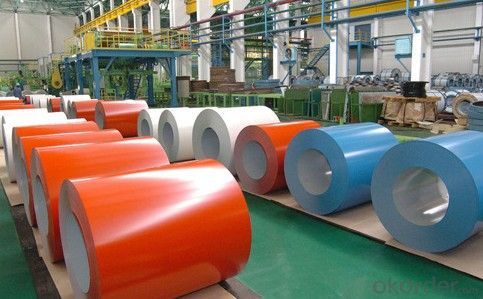
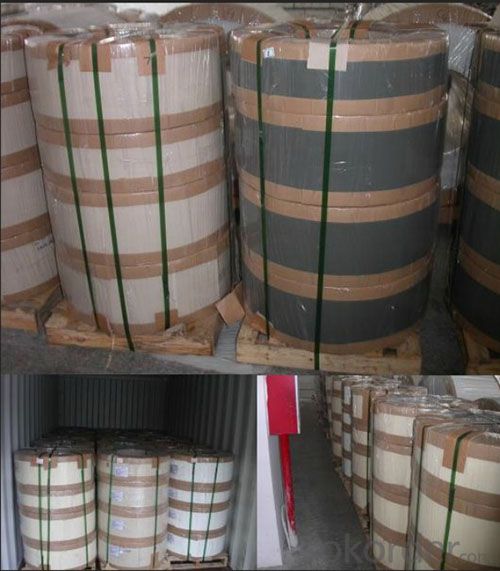
FAQ
--Q: Do you provide free samples?
--A: Yes, free samples will be sent to you on freight at destination.
--Q: Can I get your latest products catalogue?
--A: Yes, it will be sent to you in no time.
--Q: What is the MOQ?
--A: 2 tons
--Q: What are your payment terms?
--A: We accept L/C, T/T.
--Q: What kinds of alloy can you supply?
--A: 1000 series: 1050, 1060, 1070, 1100, 1145, 1200
3000 series: 3003, 3004, 3105, 3104
5000 series: 5052, 5083, 5754, 5182
6000 series: 6061, 6063, 6062, 6063
8000 series: 8011, 8021
--Q: What’s the coating of top side?
--A: PVDF and PE coating
--Q: What kinds of temper can you supply?
--A: O-H112: O,H12,H14,H16,H18,H22,H24,H26,H,32,H34,H111,H112, T3, T4, T6
- Q: Are there any specific guidelines for handling and storing aluminum coils in warehouses?
- Yes, there are specific guidelines for handling and storing aluminum coils in warehouses. Some key guidelines include ensuring proper ventilation to prevent condensation and humidity, storing coils on pallets or racks to prevent damage, using appropriate lifting equipment to handle coils safely, avoiding stacking heavy items on top of coils, and regularly inspecting for any signs of damage or corrosion. Additionally, it is important to follow any manufacturer-specific guidelines for handling and storing aluminum coils.
- Q: Can aluminum coils be used for food processing conveyor systems?
- Yes, aluminum coils can be used for food processing conveyor systems. Aluminum is a durable and lightweight material that is resistant to corrosion, making it suitable for food processing environments. Additionally, aluminum is non-toxic and does not react with food, ensuring the safety and quality of the processed products.
- Q: What are the typical delivery options for aluminum coils?
- The typical delivery options for aluminum coils vary depending on the supplier and the specific requirements of the customer. However, there are a few common delivery options that are often available. 1. Direct delivery: Many aluminum coil suppliers offer direct delivery to the customer's location. This can be especially convenient for customers who require large quantities of coils or have limited transportation capabilities. The supplier will typically arrange for a truck or shipping container to transport the coils directly to the customer's facility. 2. Pickup from supplier: Customers also have the option to arrange for their own transportation and pick up the aluminum coils directly from the supplier's location. This option is often chosen by customers who are located in close proximity to the supplier or have their own transportation logistics in place. 3. Third-party logistics (3PL): Some suppliers work with third-party logistics companies to handle the delivery of aluminum coils. These companies specialize in transportation and can provide efficient and cost-effective delivery services. This option is commonly used by customers who prefer to outsource their logistics operations. 4. International shipping: For customers who require aluminum coils to be delivered internationally, shipping options such as air freight or ocean freight are available. These methods may incur additional costs and longer delivery times due to customs clearance and transportation logistics. It is important to note that the specific delivery options may vary depending on the supplier's capabilities and the customer's location. Therefore, it is recommended to discuss delivery options directly with the supplier to ensure the most suitable and cost-effective method is chosen.
- Q: How are aluminum coils used in the production of medical equipment?
- Aluminum coils are widely used in the production of medical equipment due to their unique properties and versatility. One of the primary applications of aluminum coils in the medical industry is in the manufacturing of various medical devices, such as MRI machines, X-ray machines, and ultrasound equipment. Aluminum coils are utilized in the production of medical equipment mainly because of their excellent conductivity. This property allows them to efficiently conduct and dissipate heat, which is crucial for the proper functioning of medical devices. For instance, MRI machines generate a significant amount of heat during operation, and aluminum coils help in regulating and maintaining the desired temperature to ensure optimal performance and patient safety. Moreover, aluminum coils are also highly malleable and can be easily formed into different shapes and sizes. This makes them ideal for the production of medical equipment, where intricate designs and precise specifications are often required. For example, aluminum coils are used in the construction of radiation shields, which protect medical personnel and patients from harmful radiation emitted by X-ray machines. In addition, aluminum coils are lightweight yet durable, making them an excellent choice for medical equipment that needs to be portable or easily maneuvered. This is particularly important for devices like portable ultrasound machines, where lightweight components are necessary for ease of use and transportation. Furthermore, aluminum coils have excellent corrosion resistance, which is vital in the medical field where cleanliness and hygiene are of utmost importance. The resistance to corrosion helps in preventing the buildup of bacteria, germs, and other contaminants on the surface of medical equipment, ensuring a safe and sterile environment for patients and healthcare professionals. Overall, aluminum coils play a crucial role in the production of medical equipment by providing properties such as conductivity, malleability, lightweight, durability, and corrosion resistance. These properties allow for the efficient and safe operation of medical devices, contributing to improved patient care and well-being.
- Q: What industries utilize aluminum coils?
- Several industries utilize aluminum coils across various applications. Some of the main industries include the automotive sector, where aluminum coils are used in the manufacturing of vehicle bodies and parts to reduce weight and improve fuel efficiency. The construction industry also extensively uses aluminum coils for roofing, cladding, and insulation purposes due to their durability and corrosion resistance. Additionally, the aerospace industry relies on aluminum coils for aircraft construction, as they offer a lightweight yet sturdy material for structural components. Other industries such as packaging, electronics, and HVAC (heating, ventilation, and air conditioning) also make use of aluminum coils for their specific requirements.
- Q: I live in blue ridge ga and have about 2,000 aluminum cans and would like to know how much I can get for them.
- The price for scrap aluminum cans varies litteraly every day. Within the last year, it has been between about 28 cents and 50 cents a pound. The last price I saw for clean, flattened cans delivered to the dealer was about 42 cents. As I said, it could be a bit higher or lower than that now. There are about 30-32 cans per pound of aluminum, so your 2,000 cans probably weigh around 64 pounds and could be worth about $27, assuming there has been no big change in the price recently. But that's a delivered price. If you have to drive 10 miles each way and your truck gets 20 mpg, you will be paying for a gallon of gas. If it is 30 miles each way (60 miles total), you are looking at 3 gallons of gas, which is probably about $8, leaving you a profit of around $19, or maybe a little less. That's with some optimistic assumptions, and it doesn't include the cost of big plastic bags to carry the cans. Not very encouraging, is it? Recycling makes sense for a big city or a recycling center, where they can get thousands of cans a day. But it is hard for an individual to make any money at it. i know this is not what you wanted to hear, but I hope it is helpful anyway.
- Q: How are aluminum coils used in the production of aircraft components?
- Aluminum coils play a crucial role in the production of aircraft components. These coils are typically made from high-quality aluminum alloys that offer a combination of strength, durability, and lightness, making them ideal for aircraft manufacturing. One primary use of aluminum coils in aircraft production is in the fabrication of sheet metal parts. These coils are processed through various techniques such as rolling, stretching, and bending to form flat sheets of aluminum. These sheets are then cut and shaped to create various aircraft components, including wings, fuselage panels, and tail surfaces. The lightweight nature of aluminum makes it a preferred material for aircraft construction as it helps reduce the overall weight of the aircraft, enhancing fuel efficiency and performance. By using aluminum coils, manufacturers can easily produce thin and lightweight parts, which contribute to the aircraft's overall weight reduction. Moreover, aluminum coils are also used in the production of structural components such as frames and beams. These coils are formed into extrusions, which are then cut and joined to create structural elements of the aircraft. Aluminum's high strength-to-weight ratio makes it an excellent choice for these components, as it provides the required strength while keeping the weight of the aircraft low. In addition to its structural applications, aluminum coils are also used in the production of various aircraft systems. For instance, these coils are utilized in the construction of heat exchangers, air conditioning units, and fuel tanks. The excellent thermal conductivity of aluminum allows for efficient heat transfer, which is crucial for maintaining optimal operating conditions within the aircraft. Overall, aluminum coils are extensively used in the production of aircraft components due to their lightweight, high strength, and excellent thermal properties. Their versatility and ability to be processed into various shapes and sizes make them a preferred material for manufacturing crucial aircraft parts, ensuring the safety, performance, and efficiency of modern aircraft.
- Q: Are aluminum coils suitable for marine environments?
- Due to their excellent corrosion resistance properties, aluminum coils are well-suited for use in marine environments. One of the reasons for this is that aluminum naturally develops an oxide layer on its surface, which acts as a protective barrier against saltwater corrosion. Consequently, aluminum coils demonstrate a high level of resistance to rust and deterioration caused by exposure to marine conditions. Furthermore, the lightweight nature of aluminum makes it an ideal choice for marine applications where reducing weight is crucial. Moreover, aluminum coils possess good thermal conductivity, which is advantageous for dissipating heat in marine cooling systems. All in all, aluminum coils are a dependable and durable option for marine environments, guaranteeing long-lasting performance and minimal maintenance needs.
- Q: Are aluminum coils suitable for insulation purposes?
- Indeed, aluminum coils are well-suited for insulation purposes due to their exceptional heat and electricity conductivity. This quality makes them a perfect selection for insulation applications. Aluminum coils find utility in a wide range of uses such as HVAC systems, refrigeration units, and electrical wiring. Typically, these coils are coated with an insulating material like polyurethane foam or fiberglass to augment their insulation capabilities. The amalgamation of aluminum and insulation works wonders in impeding the transfer of heat or cold, thereby providing superb thermal insulation. Moreover, aluminum is lightweight, sturdy, and resistant to corrosion, rendering it a dependable choice for long-lasting insulation requirements.
- Q: Can aluminum coils be used in the manufacturing of aircraft parts?
- Yes, aluminum coils can be used in the manufacturing of aircraft parts. Aluminum is a lightweight and durable material that is widely used in the aerospace industry due to its high strength-to-weight ratio and corrosion resistance. The coils can be formed and machined into various components such as fuselage skins, wings, and structural frames, making them an ideal choice for aircraft manufacturing.
Send your message to us
Prepainted Aluminum Coil for Sale - Color Coated Aluminum Roll for Glass Curtain Wall Frame
- Loading Port:
- Shanghai
- Payment Terms:
- TT OR LC
- Min Order Qty:
- 2 m.t.
- Supply Capability:
- 50000 m.t./month
OKorder Service Pledge
OKorder Financial Service
Similar products
Hot products
Hot Searches
Related keywords
